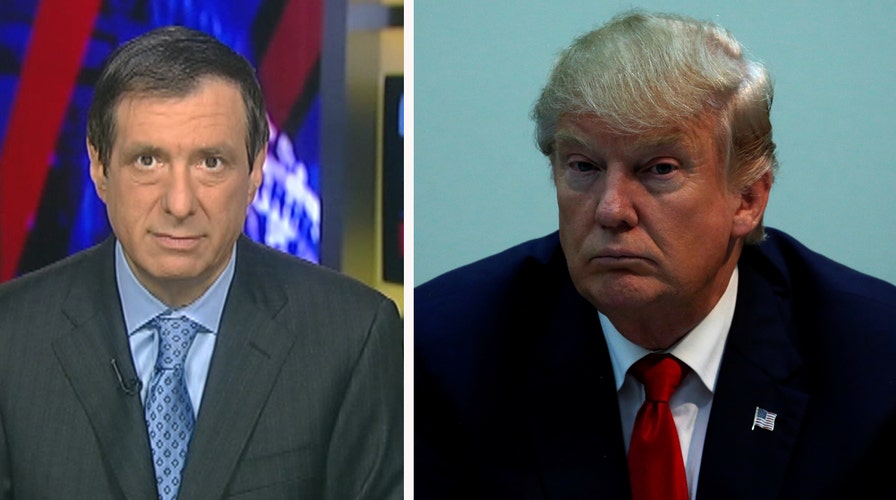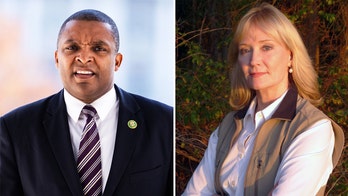Kurtz: The press wants Trump gone
'MediaBuzz' host Howard Kurtz weighs in on the media's animosity and bias towards Donald Trump
The mainstream media are gearing up to congratulate themselves for a Donald Trump defeat.
And then to flip the off switch on the Trump phenomenon.
Which may not be that hard to do, since I’m told that the candidate himself hasn’t expressed any interest in launching a television network—a decidedly hard slog-- despite the widespread media assumption that it’s his next move.
Now Trump may defy the polls and prognosticators and win the White House, but if he doesn’t, we’re seeing the first high fives for what many journalists are viewing as their vindication.
Just to be clear, Trump has suffered a number of self-inflicted wounds since winning the nomination. But he has also been hit with the most sustained wave of hostile coverage ever aimed at a major-party presidential nominee. And some journalists have justified this by saying Trump is such a dangerous figure that he can’t be treated like a normal candidate.
The sheer volume of Trump coverage, versus that devoted to Hillary Clinton, is amazingly unbalanced. Sure, he drives more clicks and ratings. Sure, this helped him in the primaries, though much of it was negative and Trump drove the coverage by dominating the dialogue and constantly granting interviews. But the press helped turn the general election into a referendum on Trump.
Take yesterday’s two-page New York Times spread on all the targets Trump has insulted on Twitter, from Maureen Dowd, Glenn Beck and Fox News to Macy’s and Major League Baseball. All his words, so it’s fair game. But where is the comparable compilation of all the insults from in Clinton camp emails revealed by Wikileaks?
I have no quarrel with the New York Times publishing Trump’s tax returns or the Washington Post investigating the Trump Foundation or posting the infamous “Access Hollywood” tape. But can anyone really say there’s been a comparable vetting of the Democratic nominee, even allowing for the fact that she’s been in politics for three decades?
Carl Cannon, executive editor of Real Clear Politics—and no Trump admirer—says that if Clinton wins, “the 2016 election will be remembered as one in which much of the mainstream media all but admitted aligning itself with the Democratic Party.
“The Washington Post calls Trump (but never Clinton) a liar in ostensibly straight news stories; its columnists, left, right and center, routinely take aim at Trump supporters; the paper termed Trump ‘a unique and present danger’ in an editorial it published during the Republican convention.” A Post editorial “compared Trump to Stalin and Pol Pot.
“The New York Times editorial board was also not content to merely endorse Clinton: It used a separate editorial solely to excoriate Trump, ‘the worst’ presidential nominee in modern history…The Times published a front page essay essentially arguing that covering the 2016 election even-handedly is ‘an abdication’ of a higher principle.”
Cannon also quotes Politico: “The conclusion is inescapable: Trump’s mishandling of facts and propensity for exaggeration so greatly exceed Clinton’s as to make the comparison almost ludicrous..."
“If Trump is so horrible — so far beyond the pale — why do his critics find it necessary to twist his words, characterize everything he does in the least charitable light, pretend they don’t know when he’s kidding, and exaggerate their own records?”
I would put commentators in a different category, although here too, he is that rare Republican who is bashed not just by the left but by many #NeverTrump types on the right.
Even liberal journalist Glenn Greenwald has said that “the U.S. media is essentially 100 percent united, vehemently, against Trump, and preventing him from being elected president.”
So if Trump loses, there will be a loud chorus of we-tried-to-warn-you from the pundits and media outlets that treated him as a grave threat to democracy. Far less time will be devoted to why 50 million people voted for him, in many cases out of anger and frustration with politics as usual.
And after that? Most attention will turn to the incoming Clinton administration, but Trump, as a political and cultural phenomenon, will still have the ability to make news.
Washington Post media columnist Margaret Sullivan wants “relief from the madness,” but fears that the media will be “reluctant to let go.” She insists that “the ratings-driven attention to Donald Trump’s every outrageous word and deed should come to a screeching halt.”
And: “The ugly truth is that the Trump/media relationship has worked for both, while doing damage to the nation. Adulation for the narcissist. Vast audiences for those who direct the spotlight.”
I wouldn't describe the Trump-media relationship as one of adulation, and obviously a former nominee with a real estate empire and reality-TV background is going to get some attention. But unless he tries to lead a new political movement at age 70, I think that attention will be rather modest.





